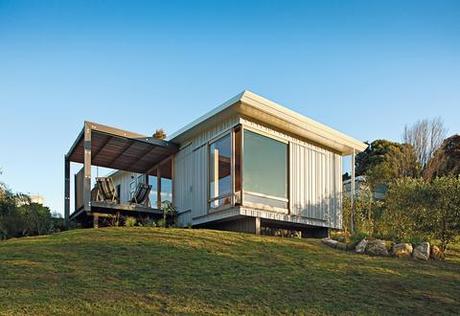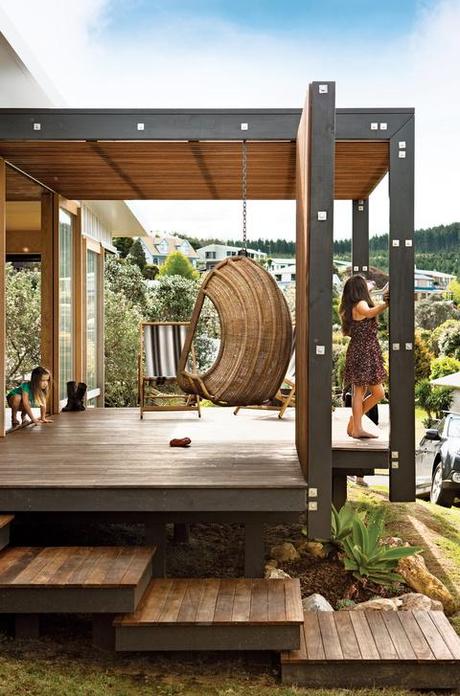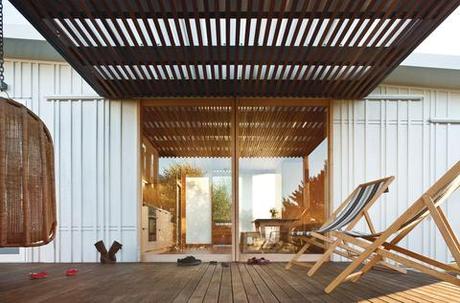
A compact prefab vacation home in the seaside community of Onemana Beach is clad in plywood and vertical timber battens finished in Resene’s Lumbersider paint in Foam. Photo by Simon Devitt.
Every summer for over a decade, Andrew and Shiree Morrison have journeyed to Onemana, a coastal town on New Zealand’s North Island. They used to stay in a small trailer, often fantasizing about building a house on their sloping plot of land but always coming up short on the amount of money needed to get a project underway. So their longtime friend, builder John Cocks, suggested an unconventional solution to obtaining a custom home within their budget: collaborating with architecture students.
Slideshow
The topography proved challenging so the designers elevated the house on piers. Photo by Simon Devitt.
At Auckland’s Unitec Institute of Technology, Dave Strachan leads a program called Studio 19. The year- long class guides students through every step of a real-world architectural project, from client brief to full-scale build. He modeled the program after Studio 804, out of the University of Kansas, and Auburn University’s Rural Studio, which he greatly admires. “Ours is a Kiwi version of that,” Strachan says. Four teams of four take the brief from the client, devise a plan, adapt the design, file all the necessary permits, construct the house on-campus, then truck it to the site. For 12 months, the students ran their own prefab factory.The Morrisons wanted something modest in size, modest in price, and visually distinctive from other houses in the neighborhood. “There’s a lot of prefab in the area, and the houses all look the same: a standard-pitch roof, the same joinery, the same cladding, windows in the same place,” says Andrew. “We just wanted to be outside the square a bit but not to the point where it stuck out like a sore thumb.”
Slideshow
Sliding glass doors made from Viridian’s ComfortPlus glass and yellow cedar wood (above) lead to decks flanking the kitchen and dining room. Photo by Simon Devitt.
The 807-square-foot house is an exercise in subtleties. The Morrisons, Strachan, and Cocks pored over every detail with the students to create a design that’s tailored to a casual coastal lifestyle. Hidden storage lies beneath the living room sofas, which also double as guest beds. The house’s floor is level with the nearly 270 square feet of outdoor decks for a seamless transition between indoors and out. The shower is accessed directly from the deck to reduce tracking sand throughout the house—a boon for Andrew, who is an avid surfer, and the family after they return from the beach. Louvered win- dows above the interior doors help fresh air permeate every room. A corner of the living room opens up for an unobstructed view of the landscape— a complicated feat of engineering that yields a striking visual impact.At the project’s outset, the Morrisons were neither for nor against prefab but were still skeptical about designing by committee. Worries were quickly allayed as the build progressed and was completed on time—and on budget at about $112 per square foot. “Everyone was passionate. In the end, it was a really good open forum,” he says. “The students did an amazing job—I’d give them an A+.”
